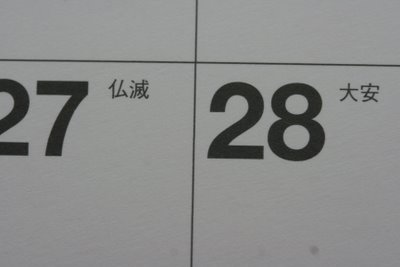
On some calendars sold here, there are kanji or Chinese characters written after the date. Some people look at them to decide when to plan events. The kanji tells which day is the luckiest and which is not suitable for an event. The kanji for each day changes from year to year. Above is an example of two dates on this year's calendar for November.
The kanji after the 27th is butsumetsu. No celebrations should be planned for that day. The kanji after the 28th is taian, the best day to plan an event. Those days are usually chosen for weddings and store openings, etc. Tomobiki which means "friends will follow" is never chosen for funerals or memorials. Our wedding was on a tomobiki. That was okay.
There are other kanji, used for the dates, but Baba doesn't know what the belief is behind them. The ones I mentioned are the ones she pays attention to. She selected a day for the memorials based on this. Some people may not pay attention to this at all. Not all calendars have these written next to the dates.
October 16, 2006
Choosing Good Days
Posted by
Annie Donwerth Chikamatsu
at
9:15 PM
![]()
Labels: calendar, October in Japan
Subscribe to:
Post Comments (Atom)











No comments:
Post a Comment